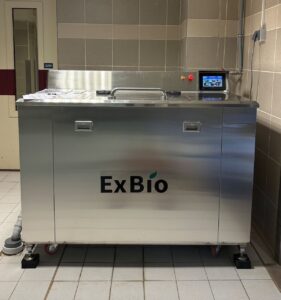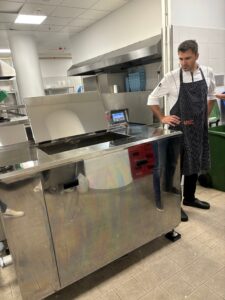Based on the results of the expert study “Innovative Solutions for Bio-Waste Management” conducted at the Polytechnic of Rijeka, we have concluded that awareness regarding bio-waste management is at very low levels.
We expect that ExBio devices will significantly reduce the amount of food bio-waste. As a market leader in Croatia in the field of innovative waste management solutions, especially concerning food waste, we are confident that this will help reduce greenhouse gas emissions, methane, CO2, and other pollutants, says Sven Darrer, procurator of DARRER d.o.o., the distributor of ExBio devices, to Diplomacy&Commerce. He emphasizes that this will improve the overall environmental quality in both the hospitality and tourism sectors.

Could you tell us more about the solutions currently being implemented in Croatia to reduce food waste?
We are the importer and distributor of ExBio aerobic digester devices for Croatia, the region, and Eastern Europe, from the American/Korean company ExBio NA. These devices help prevent the formation and accumulation of food waste, reducing the amount of this waste sent to landfills and contributing to effective waste management.
We are discussing sustainable waste management in the hospitality/tourism sector. Could you provide more information on the technologies used to prevent the generation of food waste?
Devices such as ExBio aerobic digesters are recognized as best practice examples because they enable rapid processing of food waste in institutional and commercial settings by mimicking the natural digestive process. Our aerobic digestion devices use natural microorganisms in the presence of oxygen and warm water on-site. This technology efficiently breaks down food waste into liquid within 24 hours or less, without the need for food grinding or shredding. The waste liquid exiting the digester units is directly discharged into the sewer system through your existing infrastructure and can be further recycled at wastewater treatment facilities. We save your time and money while reducing environmental impact compared to other waste disposal methods. We comply with food waste disposal regulations while also thinking green.

What are the advantages of using these devices for the hospitality/tourism sector, and what are the obstacles?
The advantages are numerous. Firstly, the devices offer significant savings to users by reducing the amount of waste that needs to be transported to landfills. Secondly, they reduce greenhouse gas emissions associated with waste transportation. Additionally, these devices are adaptable and available in several different models, meaning they can process varying amounts of waste from kitchens of different sizes. On the other hand, one of the main obstacles is resistance and misunderstanding among entrepreneurs in the hospitality and tourism sector regarding the importance of sustainable waste management. There is still a prevailing belief that maximizing profit is paramount, while environmental protection often takes a back seat.
What positive examples do you notice when it comes to environmental protection in the context of your business?
Fortunately, perceptions are gradually changing. There are increasing examples of socially responsible business practices and investments in environmental protection within the tourism sector. These efforts are aligned with the goals of European Union policies and national waste management policies, which emphasize reducing waste at the source.

Have businesses recognized this method of preventing food bio-waste?
Every day we are receiving more inquiries, but we are particularly proud of our first customers: Hotel Lero in Dubrovnik, Hotel Palace from the Adriatic Luxury Hotels group in Dubrovnik, Aminess Khalani Hotel in Makarska, the Home for the Elderly and Infirm in Osijek, the Elderly Home Domenico Pergolis in Rovinj, the Adult Home Mother Maria Petković in Blato Korčula, the Elderly Home Konavle, the Elderly Home Saint Ana in Zagreb, as well as the General and County Hospitals in Vinkovci, and the Specialized Hospital for Long-Term Care in Duga Resa.We are currently in final negotiations and preparations for the delivery of machines to several kindergartens and well-known hotel chains.
How adaptable are the devices you offer and what models are available?
ExBio NA has been a global leader in aerobic digestion devices for 20 years. We are present in over 20 countries, supplying hotels, restaurants, campsites, cafeterias, public kitchens, and more. Our smallest device processes 10 kg per day. Whether you need processing capacities of 25, 50, 100, 200, 300, 500, 1000, or uniquely worldwide, 3,000, 5,000, or 10,000 kg per day, we have all these models available. We systematically develop replacements for microorganisms and Biochips, with enzyme replacements needed every 6-12 months and Biochip replacements every 1.5-2.5 years. Real-time monitoring of food input and processing provides transparency and control over the process. The plug-and-play system with low energy consumption adjusts to your needs (220 V 50/60 Hz). ExBio devices comply with the provisions of Articles 12 and 13 of the Regulation on Limit Values for Wastewater Emissions NN 26/2020 and meet these requirements.